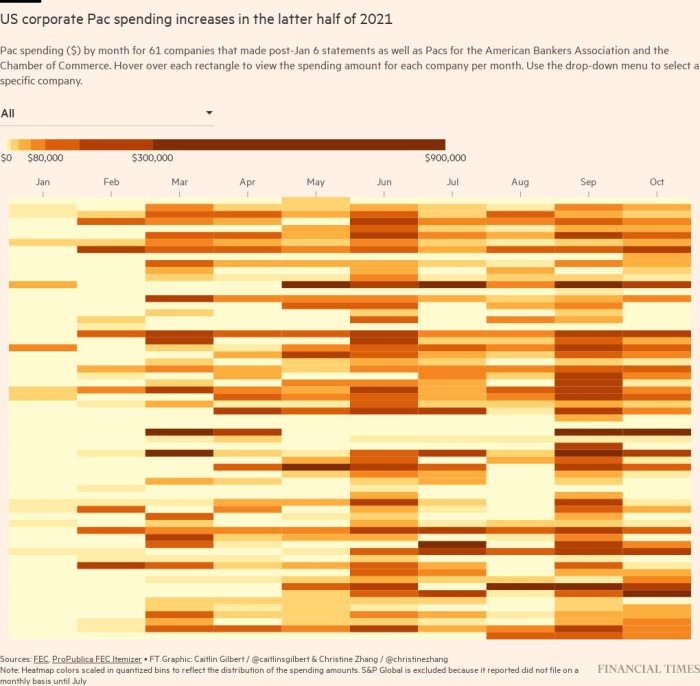Republican lawmakers are on course to end the year with more cash on hand than their Democratic counterparts, underscoring the battle Joe Biden’s party faces to retain control of Congress in next year’s midterm elections.
Federal Election Commission filings out this weekend show the National Republican Senate Committee, which works to elect Republicans to the upper chamber of Congress, had nearly $30m cash on hand at the end of October — almost double the $15.9m the Democratic Senatorial Campaign Committee had in the bank.
The National Republican Congressional Committee, which is focused on electing Republicans to the House of Representatives, had roughly the same amount — $68m — cash on hand at the end of last month, compared to its Democratic counterpart, the Democratic Congressional Campaign Committee.
The president’s party holds the House and Senate by razor-thin majorities. Democratic leaders have fretted in recent months about their prospects at the ballot box as Biden’s approval ratings continue to decline, and in the wake of an electoral backlash in state and local elections earlier this month. Republican Glenn Youngkin won the governor’s race in Virginia, a state Biden took last year by more than 10 points.
The non-partisan Cook Political Report this week changed its ratings for three key Senate races — in Arizona, Georgia and Nevada — from “lean Democrat” to “toss-up”, underscoring the challenges incumbent Democratic lawmakers face in their bids for re-election next autumn.
The FEC disclosures also highlight the Republicans’ ability to reverse their fundraising fortunes after a start to the year marred by the January 6 attack on the US Capitol. Mobs of former president Donald Trump’s supporters stormed the Capitol and interrupted the certification of Biden’s Electoral College victory in a riot that left at least five people dead.
In response, dozens of America’s biggest businesses said they would scrap or suspend donations from their political action committees to Republicans who objected to certification of the election result, sparking concern within GOP ranks about how the party would compete in terms of money raised.
But the latest filings demonstrate how, after stockpiling employee contributions in recent months, corporate America has largely resumed giving to GOP committees and candidates, bolstering the Republicans’ coffers as next year’s midterms loom. The NRSC is run by Rick Scott, the Republican senator from Florida, who was one of eight GOP senators who objected to certification.

A Financial Times analysis of 64 corporate political action committees and business lobby groups that made statements about re-evaluating their donation policies in the wake of January 6 shows 10 big businesses gave $212,500 to Republican congressional party committees in the three months to the end of October. Eight corporate PACs gave $157,500 to Democratic congressional committees during the three-month period.
Thirty-eight corporate political fundraising arms gave $386,500 to GOP leaders on Capitol Hill, either directly or through affiliated committees, over the same time period.
The FT analysis found at least 22 companies have made the maximum donation to all four national party committees — the NRSC, NRCC, DSCC and DCCC — since the start of the calendar year. Those companies include: Google parent Alphabet, Altria, American Airlines, AT&T, Boeing, Comcast, CVS Health, Delta, Eli Lilly, FedEx, Ford, Genentech, Lockheed Martin, Pfizer, PG&E, PwC, Raytheon, T-Mobile, United Airlines, UnitedHealth Group, Walmart, and Wells Fargo.
Federal election laws limit the amount PACs can give to national party committees per year at $15,000. PACs can give no more than $5,000 to specific candidates per election.
Corporate PACs for four companies — parcel delivery company FedEx, pharmaceutical firm Eli Lilly, cable company Comcast and biotechnology group Genentech — made the maximum legal contributions to the Democratic party committees earlier in the year, before doing the same for Republican committees later in the year, FT analysis showed.
Credit: Source link















